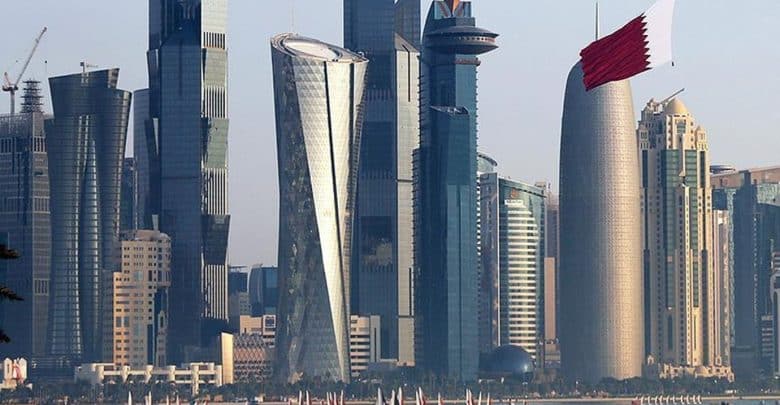
QC Chairman: 47,000 companies and 293 factories established in 3 years
رئيس غرفة قطر: 47 ألف شركة و293 مصنعاً تم تأسسيهم في 3 سنوات
The Peninsula – Doha:
Qatar Chamber (QC) Chairman Sheikh Khalifa bin Jassim Al Thani has said that the unjust blockade imposed on Qatar three years ago (June 5, 2017) has not only miserably failed to slow down the rapid growth of Qatari economy, but the country has also managed to transform its negative impacts into benefits.
In a statement issued on the third anniversary of the blockade Sheikh Khalifa said that the blockade has contributed to accelerating economic development and boosting foreign trade, especially with the opening of the Hamad Port and the inauguration of direct sea shipping routes with a number of brotherly and friendly countries.
Sheikh Khalifa also noted that the Qatari economy has proved that it is a robust and resilient economy against crises, affirming that it continued to maintain an accelerated pace of growth, according to the estimates of the World Bank Fund.
He said that the State of Qatar has managed during the siege to achieve self-sufficiency in many goods and products by developing food security, agriculture, and industry sectors.
Underlying the role of the Qatari private sector, he pointed out that it has defeated the siege since its onset and managed to prove itself as a real partner to the public sector in the march of economic development.
The private sector succeeded in avoiding the disruption of goods that were imported from siege countries to the Qatari market by land by securing the necessary needs of the local market and developing industry sector that has witnessed a steady growth in the number of factories and increase in the productive capacity of existing factories.
Regarding the industrial sector, the QC Chairman noted that the siege has helped in accelerating the state’s approach toward encouraging local industry and facilitating procedures for new industries.
About 1464 industrial establishments operating and licensed were registered by the end of 2019 in all industrial sectors, compared to 1171 by the end of 2016.
This means the establishment of some 293 new factories during the siege years, including 162 factories in the first year of siege in 2017, 72 factories in the second year 2018, and 59 factories in the third year 2019.
Sheikh Khalifa also noted that the siege period saw a surge in exports of the private sector and the reach of local products to many foreign markets.
He revealed that about 47,000 new companies have been established in Qatar during the years of siege, assuring that the blockade period witnessed establishing more foreign investments, especially in the light of legislations and incentives offered by the state.
QC Chairman said several factors helped the country defeat the siege and transform it into economic benefits, including the economic and legislative environment, sound strategic plans as well as co-operation among all bodies, and trade relations with friendly countries.
He stressed that the blockade provided Qatari businessmen a strong impetus to expand their commercial activities, invest in new industries.
“The blockade encouraged concerned bodies to accelerate the country’s economic strategies, expand agricultural and industrial projects, increase outward investments, promote local investment and attract more foreign investments to the local market. It also included providing more incentives to the private sector for promoting local industries, increasing production, enhancing relations with friendly countries, and activating trade with countries around the world,” he added.
Highlighting the Chamber’s role during the blockade, he said it had sought – since the beginning of the blockade – to remove all obstacles faced by the private sector.
Sheikh Khalifa said QC urged merchants and businessmen, from the first day of the blockade, to urgently find alternative means to import goods. The chamber also coordinated with various government agencies concerned to form specialised committees with concerned governmental bodies to streamline procedures for the private sector in importing goods, as well as provide support for the national productions.
During the siege, QC has hosted more than 250 foreign trade delegations with Qatari businessmen to discuss mutual investment opportunities and the possibility of establishing commercial partnerships and alliances in light of the incentives, facilities and benefits for investment proposed by Qatar and the governments of those countries.
On the role of QC’s sectorial committees, he said they played a key role during the siege through holding seminars with businessmen to learn about obstacles facing them and ways of finding appropriate solutions, as well as conducting questionnaires that determine damages incurred by some companies.
source: thepeninsulaqatar
الدوحة – العرب:
قال سعادة الشيخ خليفة بن جاسم بن محمد آل ثاني رئيس غرفة قطر، إن الحصار الجائر المفروض على دولة قطر منذ ثلاث سنوات لم ينجح في كبح نمو الاقتصاد القطري، بل على العكس استطاعت قطر تحويل سلبياته إلى مكاسب، فقد أسهم هذا الحصار في تسريع وتيرة التنمية الاقتصادية وتعزيز التجارة الخارجية، لا سيما مع افتتاح ميناء حمد، وتدشين خطوط ملاحية بحرية مباشرة مع عدد من الدول الشقيقة والصديقة.
أشار سعادته في تصريحات صحافية بمناسبة مرور ثلاث سنوات على الحصار المفروض على قطر، إلى أن الاقتصاد القطري أثبت خلال أزمة الحصار أنه اقتصاد قوي ومرن في وجه الأزمات، وأنه ما زال يحتفظ بوتيرة نمو متسارعة حسب تقديرات صندوق النقد الدولي.
وأكد سعادة الشيخ خليفة، أن دولة قطر استطاعت خلال سنوات الحصار أن تحقق تطوراً ملحوظاً فيما يخص الأمن الغذائي، وكذلك في قطاعي الزراعة والصناعة، مما ساهم في تحقيق الاكتفاء الذاتي في كثير من السلع والمنتجات.
وقال إن القطاع الخاص القطري استطاع أن يهزم الحصار الجائر منذ بداياته، وأن يثبت أنه شريك حقيقي للقطاع العام في مسيرة التنمية الاقتصادية للدولة، منوهاً بالدور المهم الذي لعبه القطاع الخاص في إيجاد مصادر جديدة للسلع والمنتجات التي كانت تستورد من دول الحصار، فضلاً عن مساهمته في تأمين احتياجات السوق المحلي من السلع الضرورية، والتوجه نحو الصناعة المحلية والتي شهدت نمواً مطرداً في عدد المصانع وزيادة الطاقة الإنتاجية للمصانع القائمة.
وفيما يخص القطاع الصناعي، قال سعادة رئيس الغرفة، إن الحصار ساهم في تسريع توجه الدولة نحو تشجيع الصناعة المحلية، وتسهيل الإجراءات الخاصة بالصناعات الجديدة، حيث بلغ عدد المنشآت الصناعية المسجلة العاملة والمرخصة مع نهاية العام 2019، نحو 1464 منشأة صناعية بمختلف القطاعات الصناعية، مقارنة بنحو 1171 بنهاية العام 2016، مما يعني تأسيس نحو 293 مصنعاً جديداً خلال سنوات الحصار، منها 162 مصنعاً في سنة الحصار الأولى 2017، و72 مصنعاً في السنة الثانية 2018، و59 مصنعاً في سنة الحصار الثالثة 2019. وأشار إلى أن فترة الحصار شهدت زيادة في صادرات القطاع الخاص، ووصول المنتج الوطني إلى عدد كبير من الأسواق العالمية.
وكشف سعادة الشيخ خليفة أن أكثر من 47 ألف شركة جديدة تأسست في قطر خلال أعوام الحصار الثلاثة، منوهاً بأن فترة الحصار شهدت جذب مزيد من الاستثمارات الأجنبية إلى قطر، في ظل التشريعات والتسهيلات والحوافز التي تقدمها الدولة لجذب الاستثمارات الأجنبية.
وأشار إلى أن البيئة الاقتصادية والتشريعية والخطط والاستراتيجيات المتزنة وتعاون كافة الجهات بالدولة، بالإضافة إلى العلاقات التجارية لقطر مع الدول الشقيقة والصديقة، كلها مجتمعة ساهمت في كسر الحصار، وتحويل سلبياته إلى إيجابيات ومكاسب اقتصادية، حيث أصبح الحصار دافعاً لرجال الأعمال القطريين لتوسيع نشاطاتهم التجارية، والاستثمار في صناعات جديدة يحتاجها السوق المحلي، كما دفع الحصار الجهات المعنية إلى تسريع استراتيجيات الدولة الاقتصادية، والتوسع في المشروعات الزراعية والصناعية، وإقرار تشريعات جديدة تعزّز استقطاب الاستثمارات الأجنبية دعماً للاستثمار في الدولة، فضلاً عن تقديم حوافز جديدة للقطاع الخاص لدعم توجيه رؤوس الأموال إلى الصناعات المحلية، وزيادة الإنتاج، وتعزيز علاقات التعاون مع دول العالم، وتنشيط التجارة مع العالم الخارجي.
وفيما يتعلق بدور غرفة قطر خلال الحصار، قال سعادة الشيخ خليفة بن جاسم، إن الغرفة لعبت دوراً مهماً في مواجهة الحصار، من خلال إسهامها في حل كل المعوقات التي تواجه القطاع الخاص من خلال التنسيق مع الجهات المعنية، ومساعدة التجار في إيجاد بدائل جديدة لاستيراد السلع، وتشكيل لجان مشتركة مع الجهات الحكومية ذات العلاقة، لتسهيل الإجراءات أمام القطاع الخاص في استيراد السلع البديلة، ودعم الإنتاج والمنتج الوطني.
المصدر: alarab



